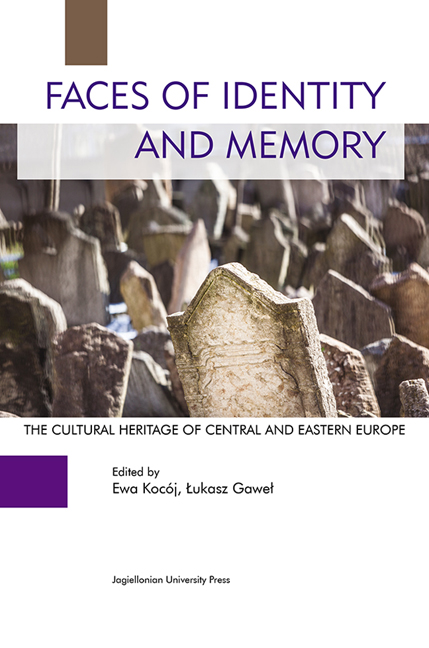 Faces of Identity and Memory
Faces of Identity and Memory Book contents
- Frontmatter
- Contents
- Introduction
- Memory and Identity. Monuments of Romanian Tangible Culture Inscribed on the UNESCO World Heritage List (a Short Presentation)
- Inventorisation and Recording of Sacral Art Objects in Lithuania in 1995–2005
- National lieux de mémoire and the European Heritage Label. Some Reflections on the Case of the Gdańsk Shipyard
- Porrajmos. Constructing Gypsy Holocaust Memory in the Recent Cinema
- The Vacuum and the Imagination of Space. The Cultural Role of the Żyznowski Publishing House
- Cultural Animation as the Art of Remembering. The Activities of the “Borderland of Arts, Cultures and Nations” Centre in Sejny
- ‘The Painted Village’ – Zalipie as an Expression of Ethnographic Tourism in the Powiśle Dąbrowskie Region of Poland
- 20th Century Theatrical Heritage: The Escape from Illusion
- Protection of Cultural Heritage. The Case of Krakow
- Managing an Artist's Legacy on the Example of Foundation for Support of Modjeska's Life and Art Research in Kraków
- Culinary Heritage as Used in the Present. Selected Elements of the Culinary Heritage Management in Contemporary Poland
Porrajmos. Constructing Gypsy Holocaust Memory in the Recent Cinema
Published online by Cambridge University Press: 10 January 2018
- Frontmatter
- Contents
- Introduction
- Memory and Identity. Monuments of Romanian Tangible Culture Inscribed on the UNESCO World Heritage List (a Short Presentation)
- Inventorisation and Recording of Sacral Art Objects in Lithuania in 1995–2005
- National lieux de mémoire and the European Heritage Label. Some Reflections on the Case of the Gdańsk Shipyard
- Porrajmos. Constructing Gypsy Holocaust Memory in the Recent Cinema
- The Vacuum and the Imagination of Space. The Cultural Role of the Żyznowski Publishing House
- Cultural Animation as the Art of Remembering. The Activities of the “Borderland of Arts, Cultures and Nations” Centre in Sejny
- ‘The Painted Village’ – Zalipie as an Expression of Ethnographic Tourism in the Powiśle Dąbrowskie Region of Poland
- 20th Century Theatrical Heritage: The Escape from Illusion
- Protection of Cultural Heritage. The Case of Krakow
- Managing an Artist's Legacy on the Example of Foundation for Support of Modjeska's Life and Art Research in Kraków
- Culinary Heritage as Used in the Present. Selected Elements of the Culinary Heritage Management in Contemporary Poland
Summary
And perhaps it is so that my memory chooses what it wants for itself? And perhaps it is even better like this because if Gypsies possessed the whole memory, they would die of grief.
PapuszaAbstract: Since the 1990s, the number of films devoted to Roma issues has been increasing at an unprecedented pace. Among them, films on the extermination of the Gypsy during the Second World War can be distinguished. Porrajmos in the Romani language means: Romani Holocaust. These events were entirely absent from the public discourse for several decades following the end of the war. The key role in addressing the subject was played by the explosion of memory about the Jewish Holocaust observable since the 1960s. Porrajmos films are in all respects secondary to the representation of the Holocaust – they emerged later, use the same set of conventions of representation, and their authors are oft en the artists who emphasize their belonging to the “community of memory” of the Holocaust: once Jewish victims, nowadays their descendants. The Holocaust discourse has thus begun to fulfill the role of “a dominant culture” which allows the story of the Gypsy genocide, providing it is its subordinate version.
The passage of time paradoxically strengthens the memory of these events, generating an ever-growing number of new places, practices and other texts of remembrance. Nowadays the origin of excavating the Gypsy Holocaust from oblivion is the imminent threat of aggression experienced by members of this ethnic group.
Key words: Porrajmos, Holocaust of the Gypsies, Romanies, Films
Introduction
Since the 1990s the number of films devoted to Roma issues has been increasing at an unprecedented pace and the new century has seen further intensification of the phenomenon. Among them, films on the extermination of the Gypsy during the Second World War can be distinguished. It has been estimated that about 90% of the population of the Roma and Sinti (German Gypsies) residing in the Third Reich and the disenfranchised countries – Austria and the Protectorate of Bohemia and Moravia – were murdered at the time. Such terrifying effectiveness would not be possible without the consent of the society - hostile or, at best, indifferent to this ethnic group. These events were totally absent from the public discourse for several decades following the end of the war.
Information
- Type
- Chapter
- Information
- Faces of Identity and MemoryThe Cultural Heritage of Central and Eastern Europe (Managing and Case Studies), pp. 75 - 88Publisher: Jagiellonian University PressPrint publication year: 2015